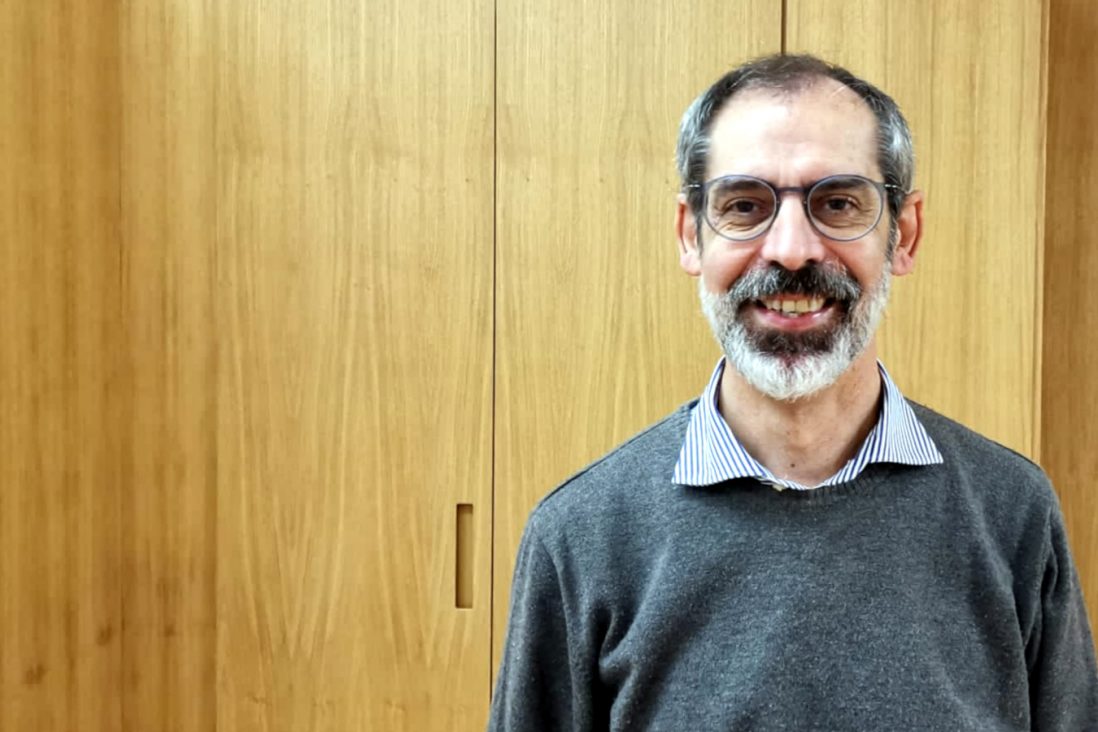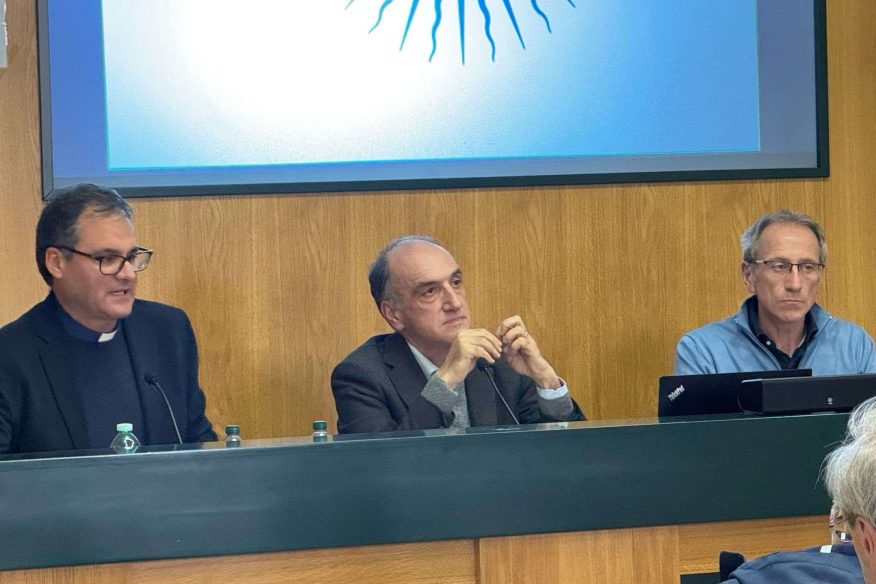Ignatian Year, Del Riccio: ‘Admidst the evil that surrounds us there is a good that is developing and must be nurtured’

The Superior of the Euro-Mediterranean Province of the Society of Jesus talks about the significance of a faith that is inculturated, about the Ignatian Year that has just concluded, about young people and the Church today: despite the wars today a collective dimension is growing, a drive for solidarity that unites peoples. On Cardinal Martini ten years after his death: he had a contemplative perspective of reality, beyond all prejudice.
The day after the closure of the Ignatian Year, Fr. Roberto Del Riccio SJ., Provincial of the Euro-Mediterranean Province of the Society of Jesus, speaks in an extensive interview on the theme of faith in the light of what Francis reaffirmed on Canadian soil, offering an interpretation inspired by his founder with which to look at the dramas of wars and the wounded dignity of peoples. Feeling responsible to be active initiators of peace processes, aware of a good that is always at work and that continually needs to be adopted: this is the authentic evangelical attitude that Fr. Del Riccio promotes.
How do you interpret the invitation to be ‘courageous’ made to the Jesuits by the Pope at the Angelus last Sunday, the feast of St Ignatius of Loyola?
I interpret it as taking note that every day we are called to take one step more than we are used to, because the challenges we are called to face are every time offering something new. In fact, the good grows but, as it grows, it poses new difficulties that must be solved. What seemed impossible yesterday because situations seemed unchangeable, the moment they improve they open up new prospects for other good to be achieved. And so, every day we are called to take these challenges seriously and it takes courage because it is more comfortable to stay where we were and continue doing as we have always done.
And this also calls into question the other invitation, which Pope Francis often reiterates, to use maximum creativity in proclaiming the Gospel. The Society of Jesus, from its origins, has gone out of its way to explore the frontiers by taking on the great challenge of inculturation, an aspect that was also at the heart of the pontiff’s penitential pilgrimage to Canada: how do you Jesuits experience it today?
I would say that the necessary thing is to turn the perspective upside down. Do not imagine, as is also partly true, that those who believe and belong to the Church, arriving in a place where the Church is absent or is very poorly present bring about what never existed before. Indeed, we must learn to look at God already at work where we arrive, what has already been done by God in that situation. In this sense, cultures – as they are presented by Pope Francis in Evangelii gaudium – are exactly that: the way of living in a given territorial reality, with a whole wealth of habits, customs, ways of dealing with reality, of interpreting what is happening, the society there… This it is not all to be thrown away just because it is not according to Christian practices. So, the perspective of faith that is inculturated is that of a faith that asks itself: what are the seeds that have already been sown here and have borne fruit? And, relying on this, converting what still needs to be converted. It is therefore not necessary to explicitly embrace the faith, rather we need to work as leaven in the dough. This requires the Church, not so much through imposition but as a living community to bear witness to a way of life even within that culture. That is, it cannot be done by one person or from the outside. It requires a community embedded in that specific culture that shows in its own inculturated life that it can live as a meaningful community.
The Ignatian Year that celebrated the 500th anniversary of the conversion of Ignatius of Loyola, your founder, has just concluded. How can you take stock of this anniversary?
It seems to me that the grace we asked God for during this year with insistence was to see more and more all things in Christ. And I believe that this has indeed been the greatest fruit. That is why it was not a year of celebrations, in the superficial sense of the term, because this message was at the heart of every celebration carried out this year. Going back to what I was saying earlier, a change of perspective is necessary. To do this requires taking on the perspective of Jesus: this is a gift, not just an exercise in which I strive to learn how to do something. It requires the Spirit of the risen Lord who dwells in me and allows me to see things from a perspective that is not my own.
The Secretary of the Society, Fr. Antoine Kerhuel, presiding at the celebration of the feast of St Ignatius last 31 July in Rome, recalled the drama of wars, not only the one in Ukraine, but also for example the one in Yemen, much forgotten by the media. How do you regard these worrying scenarios?
I reiterate what I was saying a moment ago. That good must always be rebuilt and that there is a temptation to fall back into old ways, including the dramatic forms of violence and war. Now, this engaging in the struggle between good and evil that stems from the freedom that God has given man is the attitude we must have. And it requires the ability to recognise that, despite the evil present, there is a good that can be cultivated. But it does not exclude the possibility that someone may choose a different path from what is good. We are continuously called to take a stand for the good. Paradoxically, every time it seems that we have gone backwards, but this is not true. I think of so many situations, even if only considering the war closest to us, where, for example, there is an awareness of having to defend categories of people, I am thinking of children, of having to make oneself available in preparing the ground – as our brothers did in Romania – in order to be able to accommodate people in difficulty. In the past perhaps this would have been much more casual or less evident. What is new in our time is a collective dimension, a shared concept that this attitude is fundamental, it transcends borders, it unites peoples choosing and working to do good. So even public opinion can take a stand and say: we can do it another way, on the basis of recognising the common good. This is a sign of a new mentality that has emerged thanks to more than a century of peace on our continent.
In short, no one is exempt from the responsibility to be an active architect of peace processes…
Yes, and I would say that this, by the way, is the ‘right’ way, in the biblical sense, where peace is not just the absence of war but is the fullness of life and coexistence of diversity. The biblical story begins with chaos put in order by God, with creation, and then there is the fall of man with a series of grave sins and ends with God calling a man like any other, Abraham, and entrusting him to be a blessing for the peoples. This requires someone to take the lead in a peace project that God entrusts to man.
The Euro-Mediterranean Province of the Society of Jesus includes Italy, Albania, Romania and Malta. Just four months ago, the Pope visited the island and reiterated that migrants should be treated humanely. How do these words sound to you today?
They echo deeply within me because I was present with my Maltese brothers when he met us in the nunciature. We were very touched by a fact that still moves me. One of the brethren intervened and said: they told you yesterday that Malta is a welcoming country. Your Holiness, that is not true. Being present there was a very powerful moment. First of all, let me make it clear why this statement was make; at that moment there was a ship that had been forbidden to dock, even though it had people in serious difficulty on board. The Pope’s reaction to this statement was even stronger. The first thing he asked was if there was a need for concrete help on his part, which he immediately did. We saw it happen within seconds. I think it is again a question of being protagonists of a growing good.
With boldness of speech…
That’s right, without being afraid to put things in place, even though it may appear that great solutions do not exist at that moment. If questions are not asked – as we saw it happen there, – nothing will materialise.
Is there an initiative, which specifically concerns the Italian reality of your apostolates, that you are involved in with particular gratification?
I would like to mention one activity that concerns our schools: we used to have many, today we have four plus two entrusted to external companies and cooperatives but linked through a protocol to the Society. This is a network that allows our pupils to meet each other, including those from Malta and Albania. And this makes it possible to develop formation in active citizenship which is not only limited to school activities in one’s daily environment, but also to meet in a reality that goes beyond it. It feels very good. It slowly builds relationships, meaningful relationships, one discovers many prejudices precisely through the exchange. Another experience we are having is that some of our people search for places where they know they can find that environment they experienced in the school with us Jesuits. In Bologna, for example, there are a series of flats where young people know they can live together as a community, supporting each other in their studies. In this way virtuous circles are created through common values that are already showing all the richness in terms of raising awareness and perspectives.
Speaking of young people, there is no day when the Pope invites them not to remain passive… Based on your experiences, we recall that you are also the general ecclesiastical assistant of Agesci. How do young people look at the Church today?
Where they encounter the Church for what it is, a welcoming place that helps to give meaningful answers to the most essential questions, it is a very very beautiful place. Where the Church is a place for learning practices that are no longer relevant to my life today, then they keep well away.
It’s been ten years since Cardinal Martini’s death. What is his greatest legacy?
Cardinal Martini’s most significant dimension seems to me to be his invitation to have a contemplative perspective of reality. One of his first Pastoral Letters to the city of Milan comes to mind. The Church of this city was invited to discover the presence of the Lord in life. It is a perspective that for a non-believer means seeking the good, the common desire to seek a perspective capable of piercing the obscurity of reality. And here we come to racism that sometimes resurfaces today, truly the inability to see what is beautiful, what is good, what is true, what is rich that you possess and that I do not have and that you are different from me and that only being together can we express the totality of the good that otherwise cannot be manifested.
Article in Italian by Antonella Palermo, first published on Vatican News
